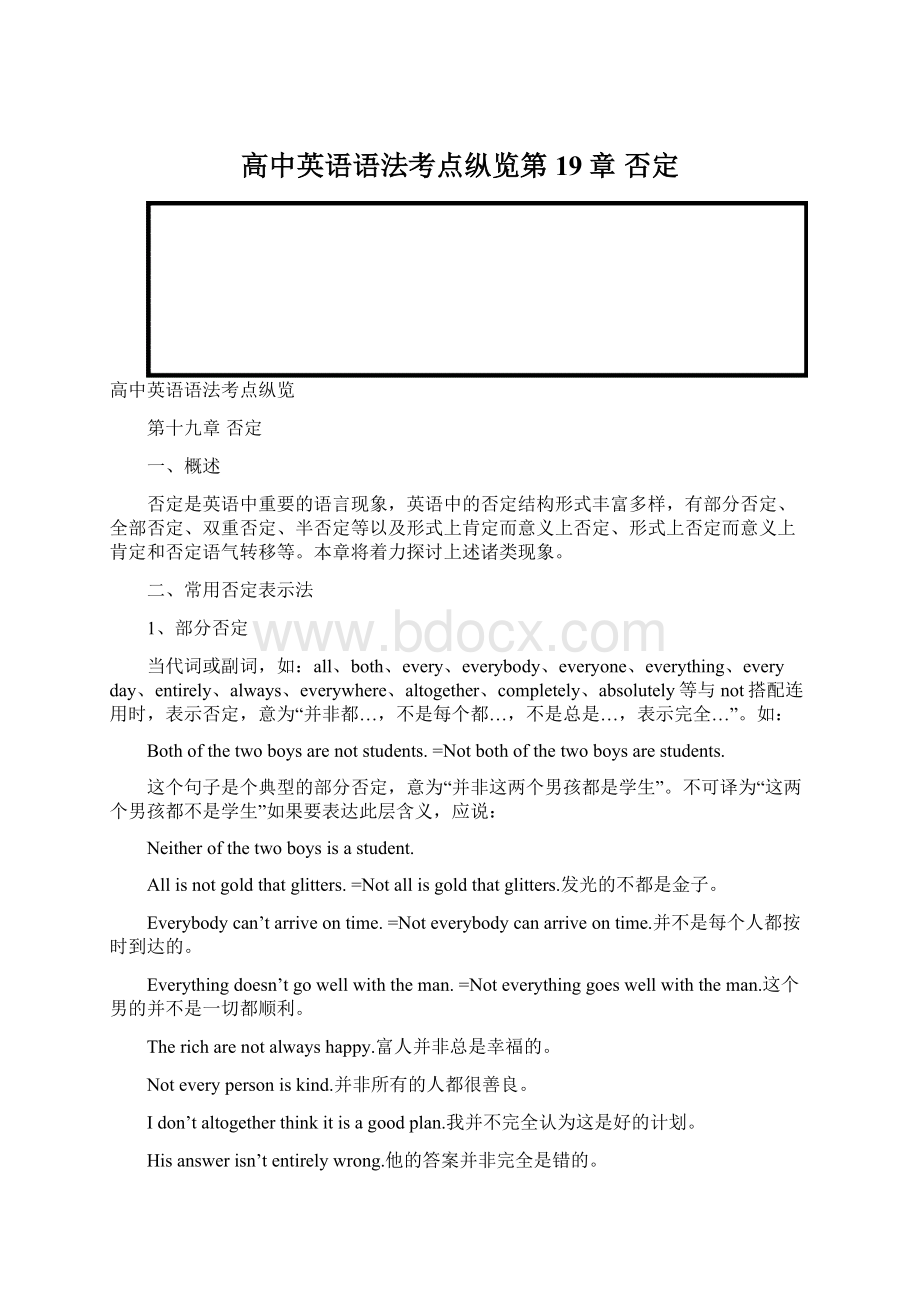高中英语语法考点纵览第19章 否定.docx
《高中英语语法考点纵览第19章 否定.docx》由会员分享,可在线阅读,更多相关《高中英语语法考点纵览第19章 否定.docx(11页珍藏版)》请在冰豆网上搜索。

高中英语语法考点纵览第19章否定
高中英语语法考点纵览
第十九章否定
一、概述
否定是英语中重要的语言现象,英语中的否定结构形式丰富多样,有部分否定、全部否定、双重否定、半否定等以及形式上肯定而意义上否定、形式上否定而意义上肯定和否定语气转移等。
本章将着力探讨上述诸类现象。
二、常用否定表示法
1、部分否定
当代词或副词,如:
all、both、every、everybody、everyone、everything、everyday、entirely、always、everywhere、altogether、completely、absolutely等与not搭配连用时,表示否定,意为“并非都…,不是每个都…,不是总是…,表示完全…”。
如:
Bothofthetwoboysarenotstudents.=Notbothofthetwoboysarestudents.
这个句子是个典型的部分否定,意为“并非这两个男孩都是学生”。
不可译为“这两个男孩都不是学生”如果要表达此层含义,应说:
Neitherofthetwoboysisastudent.
Allisnotgoldthatglitters.=Notallisgoldthatglitters.发光的不都是金子。
Everybodycan’tarriveontime.=Noteverybodycanarriveontime.并不是每个人都按时到达的。
Everythingdoesn’tgowellwiththeman.=Noteverythinggoeswellwiththeman.这个男的并不是一切都顺利。
Thericharenotalwayshappy.富人并非总是幸福的。
Noteverypersoniskind.并非所有的人都很善良。
Idon’taltogetherthinkitisagoodplan.我并不完全认为这是好的计划。
Hisanswerisn’tentirelywrong.他的答案并非完全是错的。
对部分否定要注意以下两点:
①当全称代词如上述的all、both、everybody、everyone、everything在部分否定句中作主语时,否定词not可放在全称代词前,也可放在谓语动词前,含义相同。
如:
Notallcanpassthetest.相当于Allcan’tpassthetest.均表示“并不是所有的人都能通过这次测试”。
②如果要把部分否定变为全部否定,要把上述代词或副词作相应变化,变为全部否定的代词或副词,相应地:
both→neither、all→none、everybody→nobody、everything→nothing、everyone→noone、everywhere→nowhere、always→never等。
如:
Noallhaveattendedthemeeting.(部分否定:
并非所有人都参加会议)
Nonehaveattendedthemeeting.(全部否定:
没有人参加会议)
Theboydoesn’talwaysdoashisparentssay.(部分否定:
这个男孩并不总是按他父母说的去做)
Theboyneverdoesashisparentssay.(全部否定:
这男孩从不按他父母说的去做)
2、全部否定
英语中表示全部否定时常用no、not、none、nobody、nothing、nowhere、neither、never等去表达。
如:
Nopeoplecangoabovethelaw.
Hedidn’tcometoschoolintheafternoon.
Nobodycanenterwithoutpermission.
Nowherecanyoufindsuchabeautifulpark.
HehasneverbeentoBeijing.
正确理解和辨别部分否定和全部否定非常重要,有利于正确理解和翻译。
试比较:
Idon’thearanythingaboutthenewplan.(相当于Ihearnothingaboutthenewplan.)(全部否定:
我没听说任何关于这个新计划的风声。
)
Idon’theareverythingaboutthenewplan.(部分否定:
我并没有全面听说关于这个新计划的一些风声。
)
Hedoesn’tlikealloftheflowers.(部分否定:
他并非喜欢所有的花)
Helikesnoneoftheflowers.(全部否定:
这些花他都不喜欢)
Ican’tworkoutbothofthequestions.(部分否定:
我不能把这两个问题都解决了)
Icanworkoutneitherofthequestions.(全部否定:
这两个问题我都不能解决)
3、双重否定
汉语中双重否定便表示肯定,英语中同样如此,双重否定意义肯定,双重否定即同一个句子里出现两个否定词,即否定之否定。
双重否定句表示的意思是肯定的,通常比肯定句的语气重要,翻译时可以译成肯定形式,也可以保持双重否定的形式。
如:
Noonenevermakesamistake.(人人都会犯错或没有人从来不犯错)
Itisnotimpossibletolearntodrivewithinamonth.(在一个月内学会开车不是不可能的)
Hedoesn’tgivehelptonobodyintrouble.(有困难的人他都帮助)
Youcan’tmakesomethingoutofnothing.(巧妇难为无米之炊)
Nothingisimpossibletohappenintheworld.(世上任何事都能发生)
用于表示双重否定的词,结构还有:
no…not(不…不)、no(not)…without(不…不…)、no…but(没有…不)、cannotbut(不得不)、cannothelpdoing(情不自禁)、can’thelpbutdo(不得不)、nothinglessthan(正是)、nonebut(除…外别无…)、nochoice/alternativebut(除…以外别无选择)、notseldom(常常)、notunhappy(高兴)、there’snodoubt/denying/questionthat(毫无疑问)等。
4、半否定
半否定表示几乎否定或近于否定,常用的这类表示几乎否定的词有little/few(很少,一点儿)、barely(仅仅,几乎不)、hardly(几乎不,简直不)、rarely(很少)、scarcely(几乎没有,简直不)、seldom(不常,很少)等。
如:
Thereislittlemilkleftinthebottle.
Icanhardlyunderstandwhattheprofessorsaid.
Helittleknowsthathehasmadeabigmistake.
Scarcelywayscansolvetheproblem.
Iseldomsurftheinternet.
5、形式上否定而意义上肯定
英语中有些结构看上去形式上好像是否定,但实质内容上表示肯定的含义,要特别关注此类结构的特殊含义。
(1)cannot+比较级
表示“…不能再怎么样了…”。
如:
Theanswercan’tbebetter.这个答案好的不能再好了。
Theboycan’trunfaster.这个男孩跑得快地不能再快了。
(2)cannot…too
表示“越…越…,再…也不为过”,cannot也可换为canhardly(scarcely,never),too也可改为over、enough等。
如:
Youcannotbetoocarefulwhenwalkingacrosstheroad.
Theteachercan’tpraisehimtoohighly.
Wecanhardlyloveourparentstoomuch.
Wecanneverhavefriendstoomany.
Ican’tthankyouenough.
(3)no(nobody)…but
意为“都…,没有…不…,只有…才…”。
如:
Thereisnorulebuthasitsexception.
Nobodyentersthecollegebutisstronglyimpressed.
注意:
①这种用法中but作为关系代词引导定语从句,相当于that(which,who)not,如上述Thereisnorulebuthasitsexception.相当于Thereisnorulethatdoesn’thaveitsexception.
②在疑问词或否定词后面but均有否定意义,不论作为代词还是连词均表示双重否定,即表示肯定含义。
如:
Noonethinksthathiswordsaretrue.没有人认为他说的话是真的。
(否定)
Noonethinksbuthiswordsaretrue.没有人认为他说的话不是真的或人人都相信他说的话是真的。
(肯定)
Thereisnoonewhoknowsthesecret.没有人知道这个秘密。
(否定)
Thereisnoonebutknowsthesecret.没有人不知道这个秘密或人人都知道这个秘密。
(肯定)
(4)never(not)…but(that)
意为“每当…总会…”,相当于not/never…withoutdoing,but(that)可以引导名词性从句、定语从句、条件状语从句、结构状语从句。
如:
Inever(don’t)seethepicturebutIrecalltheolddays.相当于Inever(don’t)seethepicturewithoutrecallingtheolddays.我每当看到这张照片,都会回忆起过去的时光。
Itneverrainsbutitpours.祸不单行。
Youcan’tmakeprogressbut(that)youmakegreatefforts.相当于Youcan’tmakeprogressunlessyoumakegreatefforts.或Youcan’tmakeprogressifyoudon’tmakegreatefforts.你如果不付出努力,你将不会取得进步。
Themanisnotsuchafoolbutknowstheway.这个男的还不至于蠢到不认识路。
(结果状语从句)
But(that)youhelpedme,Iwouldhavedied.(条件状语从句,主句要用虚拟语气,这里的butthat用法相当于butfor)
(5)moreoftenthannot
意为“常常,通常”,相当于asoftenasnot。
如: